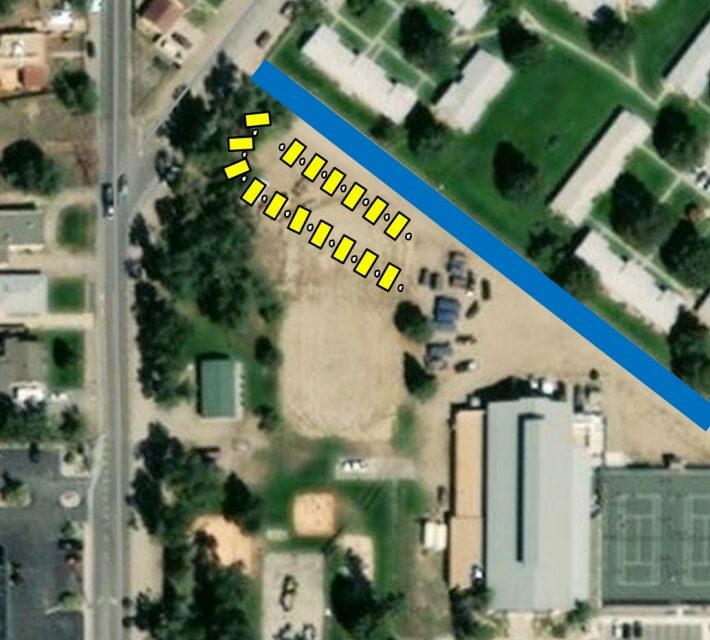Salida is scrambling, it seems, to find solutions for housing its summer workforce. No one seems more audibly passionate about this issue than Cory “Salty” Riggs, a food server in town. Witnessing her friends and co-workers struggle to find a place to sleep, and fearing they would have to leave the area, she was inspired to help implement the non-profit, “Bring Everyone Through the Crisis of Housing” or otherwise known as BETCH.

Cory “Salty” Riggs, founder of BETCH Salida. Juan Cuadros photo
“There is a disconnect of support services for most of our workforce, as they make just over the required income limits for help, yet don’t make enough to afford an average apartment in town.” According to a Chaffee County Housing Authority document, a significant portion of the population pays more than 50 percent of their income on housing.
Riggs, who has secured her own apartment in town, moved to Salida from Oklahoma five years ago for the love of the mountains and the town itself. She lived in her car voluntarily for three years, previous to moving here. When asked about those years, she replied with great enthusiasm, “It was great! I worked a flexible schedule and because my expenses were so low, I could go rafting or mountain biking in my free time. If I got tired of a place, I just drove to another town to visit friends and get a few luxuries like a hot shower and a little television.”
Car-camping became an increased solution during the pandemic for the working homeless who were afraid that shelters would not be able to protect adequately from COVID-19.
As more and more cars were being used for sleeping, other towns have adopted a concept of “safe lots,” allowing people to live in their vehicles to legally park in a church or community center parking lot for several nights, as long as they follow certain rules. For example, Longmont in the metro Denver area, enacted its Safe Lot program, in conjunction with non-profit agencies offering services to support the acquisition of more permanent housing.
Riggs’ past experience mirrors that of many in the essential workforce who have made the choice not to pay rent in a market with prohibitively high rents. It is a different way of life that not everyone might approve of. When asked about medical needs and safety, Riggs usually receives a form of health insurance from longer-term employment and referred to her dog, Elvis, as her security system back in her car-camping days.
She knew that a quick solution for housing could happen by finding a space where workers could camp or live safely in their cars. She says she solicited just about anyone who might have available land near the town of Salida ; ranchers, private residences with large swaths of property, schools, business owners, and even the Forest Service. She unabashedly presented the problem and her proposed solution to anyone who might listen.
Through the formation of BETCH, Riggs and others are raising money and awareness by putting the homeless workforce in front of the community. Among their activities; organizing fundraisers for rent support, and attending city council meetings to advocate for enacting progressive change.
“It’s hard to ignore a big group of bodies showing up to meetings at City Hall,” remarks Becky Gray, Director of Chaffee County Office of Housing, “I am grateful for the in-person representation that BETCH is providing. Salty has fostered many important relationships with her one-on-one style of advocating for the workforce population.”
Their most recent progress has been proposing the use of the parking lot behind the Salida Hot Springs Aquatic Center as an official Safe Spaces camp area. The Aquatic Center at Centennial Park was a logical choice since it has services and utilities already in place and provides the use of bathrooms too.
The concept: allowing spots for tent or car camping at that site and consideration of a proposal that the city purchase a few used camping trailers to be located at another (yet to be confirmed) site. In both cases BETCH would be the administrator of the site(s).
As Riggs swiped through dozens of documents on her iPad, she shared her enthusiasm for this first big achievement and asserted that she wants it to be successful as a model for future solutions. “We’re going to work really hard on the ‘rules’ of the camping area,” she adds, referring to KOA-type campgrounds as an example where residents follow a code of conduct that serves the campers as well as surrounding neighbors.
When asked about the other areas being offered for temporary lodging just outside of Salida, Riggs passionately commented, “We got jobs here because we want to live in Salida. Many workers would rather remain homeless than leave the town.” Indeed, many towns and cities are behind in providing ways to house their workforce. As Riggs helps to devise immediate solutions, there are a few, more permanent plans in the works such as Jane’s Place and other developments that aim to include a percentage of affordable units.
Featured image: Potential site for Safe Outdoor Space summer housing, in Centennial Park near Holman Avenue. Photo courtesy City of Salida.
Salida City Council Continues Search for Safe Outdoor Space Housing







Recent Comments